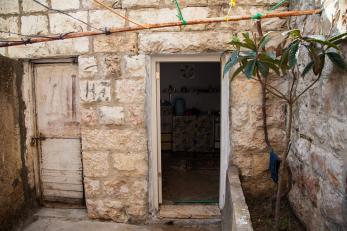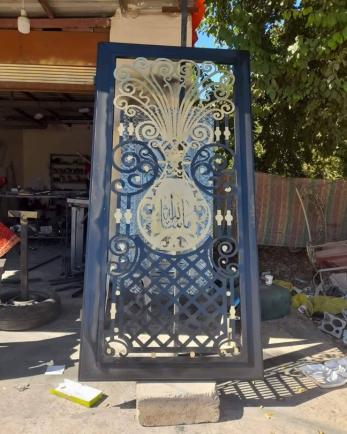Mercy Corps’ RYSE program supports vulnerable families in Jordan

In Jordan, the Syrian crisis has exacerbated many challenges, including but not limited to: higher unemployment rates, lower average wages, fewer foreign investments, and strained infrastructure and social services. In addition, low female labor force participation, rising child labor, an expanding informal labor market, and, most significantly, public frustration among Jordanians from economically disadvantaged backgrounds.
A Jordanian family Abdel Salam Al Momani (29 years old), his wife Shatha Al Momani (26 years old), and their boy kid (3 years old), from Ebin, Ajloun were among those affected by the crisis's consequences. Abdel Salam, who works as a blacksmith in Ajloun Governorate, his work has been greatly affected in the recent period due to bad conditions and accumulated debts. Shatha, like many other women in Jordan, dreams of starting her own business, but the financial situation often stands in the way.
Due to the poor financial situation, Al Momani’s family had been forced to leave their home due to an inability to pay the rent, and they were compelled to live in separate houses. The situation became worse because of their distant relationship and the fact that they have a kid of around three years old.
“I’m so tired of it!” Abdel Salam expressed frustration, saying, “Our financial condition is deteriorating, and we have tried all possible solutions to improve our situation,” “I’m afraid things will spiral out of control,” he added.
The social and economic challenges affecting refugees and Jordanians are only expected to intensify if nothing is done to address the rising volume and complexity of inter and intra community conflict, which threatens the stability and cohesiveness of local inhabitants.
Thus, to address the aforementioned challenges and help families like Abdel Salam and Shatha, as well as many others, find their way out of poverty, the Resilient Youth, Socially and Economically Empowered (RYSE) project’s consortium developed the Graduation Approach (GA), in which households are targeted with tailored support, ensuring a holistic intervention with coaching, general family guidance, cash support, and individually designed pathways for family members to ‘graduate’ towards sustainable livelihoods.
Twenty months ago, Abdel Salam and Shatha began their journey with the RYSE project as Abdel Salam has joined the project as the primary breadwinner, and Shatha as the youth member, and since then, their lives have drastically improved because of the assistance of the project.
Mercy Corps’ RYSE project is a flagship model in which youth, governments, private sector companies, investors and civil society organizations educate and empower youth to become positive change agents and leaders. The RYSE program stands on three objectives. The first objective provides training and pathways for youth to become civically engaged leaders. The second objective provides a comprehensive approach to help young people obtain the training and support needed to be strong candidates for better jobs. The third objective addresses formal societal structures that prevent youth from actively participating in civil society and the labor market.
When Abdel Salam joined the project, the RYSE team in Ajloun worked with him to develop a comprehensive livelihood plan, which has greatly benefited his family’s financial position. Additionally, as part of the graduation approach, Abdul Salam was given consumption support, which he used to buy tools that allowed him to take more blacksmithing orders and subsequently pay off his existing debts.
With time and the steady income from his work, Abdul Salam was able to improve his life situation considerably. He moved his family back in with him, rented a home, and rented a larger workshop to accommodate his growing business.
“The project saved me a lot in regulating my situation and preserving my home and family from collapsing,” Abdel Salam expressed his pleasure, and said, “I am extremely thankful to this project for its big part in our return to living in one house as any normal family.”

Shatha, along with Abdel Salam, received training sessions that helped them better manage their businesses, including Financial Education, Entrepreneurship, Professional Goals, in addition to “My Right in The Workplace” training.
Shatha also started her own home-based business, which is a food production kitchen, and she began taking orders for various types of food and pastries. Abdel Salam has also played a vital role in helping Shatha with the orders’ delivery.
“I started offering my services to several parties, and now I’m providing school teachers, employees, and pharmacists in Ajloun with breakfast meals on a regular basis,” Shatha said happily “It’s so great to see myself gaining money and helping my husband with our family’s expenditure.”
RYSE’s Graduation Approach comprises carefully sequenced interventions delivered at the household level over 24 months through different interventions which in order include: mentoring, social integration and linkages, financial literacy and savings, consumption support, core capacity building, technical skills training and livelihoods grants.
“This project has been a great blessing for me,” Abdel Salam remarked. Then he explained, “during a time when I had given up hope that my situation might improve, the project came to fix all of my problems and enhance my financial situation.” “I did not expect this to happen during this time,” he concluded.
The RYSE project is a flagship multi-stakeholder partnership that is being implemented by Jordan River Foundation, Generations for Peace, Mercy Corps, INJAZ, and the Danish Refugee Council (DRC). Thanks to the generous funding from Novo Nordisk Foundation, RYSE is empowering 25,000 Syrian refugees and vulnerable young Jordanians affected by the Syrian crisis to become positive change agents in a region marred by war and political instability.
